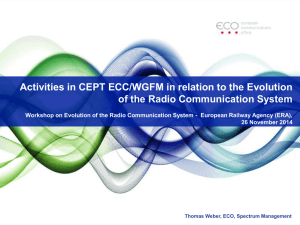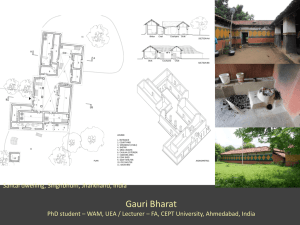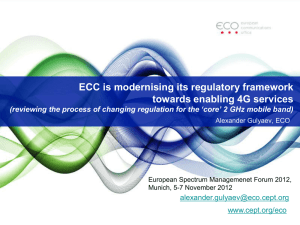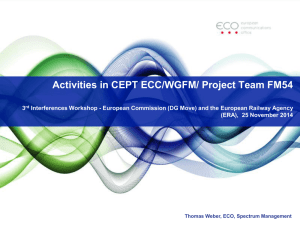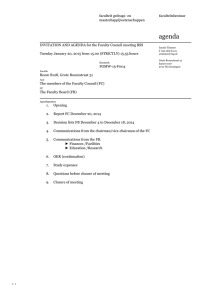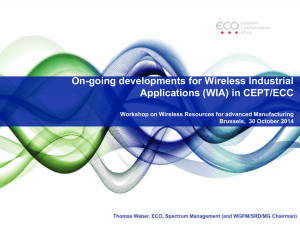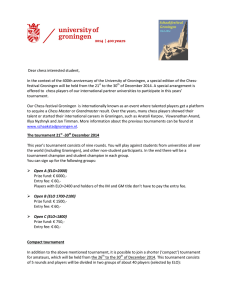PPT - Astron
advertisement
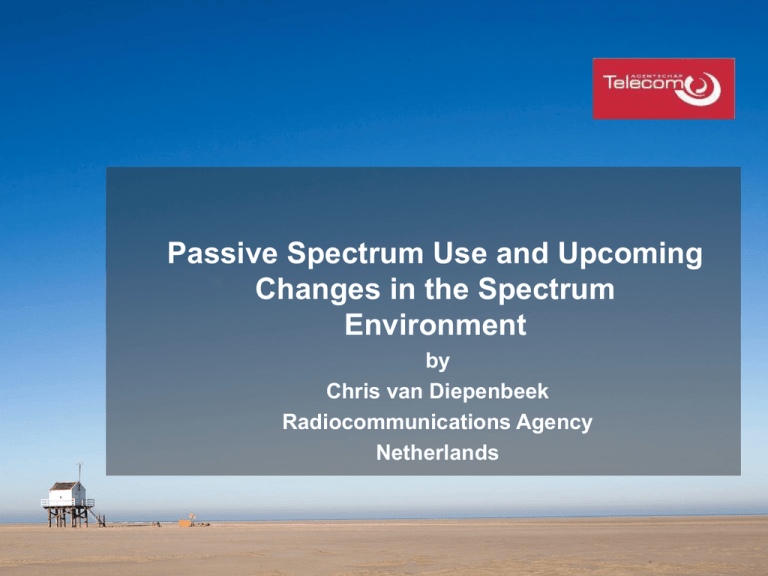
Passive Spectrum Use and Upcoming Changes in the Spectrum Environment by Chris van Diepenbeek Radiocommunications Agency Netherlands Concerns about: Commercial pressure SRR in 24 GHz UWB Cognitive Radio, Software Defined Radio Flexibility What can Spectrum Managers do ? What can Radio Astronomers do ? • RFI2010, March 29-31 2010 Groningen 2 Worldwide CEPT Spectrum environment ECC Electronic Communications Committee Europe, 48 Europe, 27 National (NL) 3 Radio Astronomers and the Radio Regulations Article 5: Table of Allocations 5.340: All emissions are prohibited in the following bands:………………….. except for 5.422, 5.483 and 5.511. these exceptions are geographical limited 5.149: administrations are urged to take all practicable steps to protect radio astronomy from harmful interference…. Various ITU-R Recommendations • RFI2010, March 29-31 2010 Groningen 4 ITU-R: some simple questions WP 7D: Radio Astronomy TG 1/8: Short Range Radar Ultra Wide Band WP 1A: Spectrum above 275 GHz WP 1B: Cognitive Radio, Software Defined Radio WP 1B: Flexibility • RFI2010, March 29-31 2010 Groningen 5 CEPT Composition: 48 Member States (decisions based on consensus) EC + EFTA Counsellors Observers: International Governmental Organizations of States: on their own right European Telecom, Industry and Science Organisations: reciprocal MoU / LoU • RFI2010, March 29-31 2010 Groningen 6 CEPT ECC Electronic Communications Committee CEPT: Electronic Communications Committee (ECC) Electronic Communications means: transmission, and, where applicable, switching or routing, which permits the conveyance of signals by wire, radio, optical or other electromagnetic means, irrespective of the type of information conveyed. • RFI2010, March 29-31 2010 Groningen 7 CEPT ECC ECC Mission Electronic Communications Committee Common policies and regulations Harmonize the efficient use of the radio spectrum, satellite orbits and numbering resource Promote interest of Europe on a world-wide basis • RFI2010, March 29-31 2010 Groningen 8 CEPT Deliverables Com ECC ECC Decisions important measures European Common for harmonization Proposals to ITU commitment to implement • CPG & Com ITU ECPs: Briefs: Reasons, background Recommendations ECC and CEPT Reports Views on other proposals. All: Public consultation CPG documents freely accessible RFI2010, March 29-31 2010 Groningen 9 CEPT ECC Electronic Communications Committee The ECC and Radio Astronomers ECC has an LoU with ESF (CRAF) Allows member participation at PT level and organisation representation at WG or Plenary Four possibilities for you to influence the ECC: Participate as observer Participate in national delegation Comment during consultations < www.ero.dk > Do all ! • RFI2010, March 29-31 2010 Groningen 10 European Commission Radio Spectrum Policy Group (RSPG) Advises Commission: Opinions on issues such as Digital Dividend, Streamlining Regulations, Collective Use of Spectrum, Secondary Trading, etc. Draft Opinions are subject to a public consultation Published on < http://rspg.groups.eu.int > You all can react ! • RFI2010, March 29-31 2010 Groningen 11 RSPG Opinion 6: A coordinated EU Spectrum approach for Scientific Use of Radio Spectrum, 25-10-’06. Objective: improve recognition Conclusions: Considerable societal value Incommensurable in financial terms Intergovernmental commitments is a European priority Exclusive allocations only for a limited portion of spectrum If sharing (for non 5.340 bands): impact on both services shall be assessed. • RFI2010, March 29-31 2010 Groningen 12 Opinion 6 and WRC agenda 8.1.1 item C Director ITU-R to Report on sector activities related to Resolution 673 (WRC-07): Radiocommunications Use for Earth observations applications: Its objective: improve recognition Res 673 has no word about Radio Astronomy In ITU-R we develop the Report about the essential role of observations (EESS etc. and RAS/SRS); Sections on RAS had a slow start Shall we change from Science to Observation Services? • RFI2010, March 29-31 2010 Groningen 13 RSPG Opinion 12: Best Practices Regarding the Use of Spectrum by Some Public Sectors,11-2-’09 Focuses on Defense, Emergency and Public Safety, and Public Transport Multiple approaches: Document the rights of use by public sector bodies; Determine needs via ex-ante detailed audit; Apply a “justification procedure”; public sector bodies have to submit a detailed explanation of their spectrum requirements. Also: acquire service from the market, introduce spectrum pricing etc. • RFI2010, March 29-31 2010 Groningen 14 Netherlands (1) Change in Telecommunication Law Public Spectrum Users have to justify their needs on a regular basis: Also Science Services have to submit every 3 years a plan containing their justified needs. • RFI2010, March 29-31 2010 Groningen 15 Netherlands (2) Minister of Education and Science to specify: Purpose and legal basis for public use use, Organisation to use, Inventory of required spectrum, Time, location, conditions for use, Further information my be requested by the Telecom Minister. What about proposing this in an ITU-R Report or Recommendation? • RFI2010, March 29-31 2010 Groningen 16 European Commission: Radio Spectrum Committee (RSC) Composed by 27 EU members; consensus preferred, weighted voting EC Decisions: implementation is obligatory CEPT Reports (and ECC Decisions) as a basis. No Public consultation For you: Lobby administrations or EC Influence the ECC Report • RFI2010, March 29-31 2010 Groningen 17 EC Decisions: related to the internal market electronic communications, transport, and R &D UWB: SRR: - ECC/DEC/(06)12 amended ECC/DEC/(07)01 (Material sensing) 2007/131/EC ECC/DEC(04)03 (77-81 GHz) ECC/Dec(04)10 amended (24 GHz temporarily) 2004/545/EC (77-81 GHz) 2005/50/EC (24 GHz temporarily) < www.ero.dk > <http://ec.europa.eu/information_society/policy/ecomm/rad io_spectrum > • RFI2010, March 29-31 2010 Groningen 18 CEPT ECC ECC: Short Range Radar in 24 GHz Electronic Communications Committee Permanent in US, Interim on 24 GHz in Europe; the European Regulation to protect Radio Astronomy is not enforceable. No take-off could lead to prolongation of interim regulations Future band: still considerable disagreement in CEPT. Prolong on limited period in 24 GHz, and move to 77-81 GHz Allow 10 %, or limited period in band 26 -29 GHz and move to 77-81 GHz. Interference ? • RFI2010, March 29-31 2010 Groningen 19 CEPT ECC ECC: Short Range Radar in 24 GHz Electronic Communications Committee CEPT Report 36 on 24 GHz put on hold, awaiting final decision on 26 GHz Provisional Conclusion: “Finally, simply by taking into account the constraints resulting from coexistence between SRR 24 GHz and EESS, FS & Radio Astronomy, CEPT can conclude that existing regulation for SRR 24 GHz systems should in principle be kept without substantial changes” (max. 7 % , or mid 2013). • RFI2010, March 29-31 2010 Groningen 20 CEPT ECC Electronic Communications Committee ECC: Short Range Radar in 24 GHz CEPT Report 37 on 26 GHz band: In Public Consultation All: as soon as possible to 77 - 81 GHz 11 Admin’s against use of 26 GHz 2 Admin’s prolong use 24 GHz under stringent commitment of car industry Express your views ! • RFI2010, March 29-31 2010 Groningen 21 CEPT ECC Electronic Communications Committee CPG: Cognitive Radio, Software Defined Radio No definitions in the Radio Regulations Any radio system may implement SDR/CRS techniques within any radiocommunication service as long as it operates in accordance with the provisions of the RR applicable for that specific service in the related frequency band. Frequencies or frequency bands (tuning range) for specific applications could be harmonized, as necessary, on world wide basis in ITU-R Recommendations or regionally. No regulatory actions would be required for SDR . • RFI2010, March 29-31 2010 Groningen 22 CEPT ECC Electronic Communications Committee CPG: Cognitive Radio, Software Defined Radio Deployment scenarios: If all systems in a certain band have CRS capabilities: CRS can share on a primary basis. In case of sharing in a band with systems not having CRS capability: CRS use is secondary to the use of the service having primary allocation. Conclusion: There is no need to exclude Radio astronomy bands. • RFI2010, March 29-31 2010 Groningen 23 Other views: Cognitive and Software Radio No change to RR’s with a WRC Resolution providing guidance for further studies; No future agenda item; No change to RR’s with a WRC Resolution dealing with the use of Cognitive Radio, further studies within ITU-R; Exclusion of Radio Astronomy and others until studies are finished • RFI2010, March 29-31 2010 Groningen 24 CEPT ECC Electronic Communications Committee CPG: Flexibility (Resolution 951) Increase flexibility in RR while ensuring compatibility between services: allocations to be done in the broadest possible way under provisions to ensure technological neutrality where possible. Include only issues which have an international implication in the Radio Regulations Use of a frequency band is decided at national or regional level, in accordance with the Radio Regulations, noting that some use is international, or has international implications Develop a WRC Resolution on principles for enhancing the international spectrum regulatory framework. • RFI2010, March 29-31 2010 Groningen 25 CEPT ECC Electronic Communications Committee CPG: Flexibility Current trend towards convergence of applications within different services; Regulations have to keep pace with developments, while ensuring effective and efficient use of spectrum allowing operation to be free of harmful interference; Decisions to modify the Radio regulations may take a period of 4-8 years, sometimes even more. • RFI2010, March 29-31 2010 Groningen 26 ITU-R: Flexibility Convergence Fixed - Mobile: Do as we have done always: every WRC Modify definitions in Article 1 to make a clear difference: at motion or at unspecified location is mobile; Fixed receiver at specified point or at any point within a specified area is Fixed Service. CEPT: Licensing will protect RAS • RFI2010, March 29-31 2010 Groningen 27 ITU-R: Flexibility General Allocation Issues: 2 views: RR’s and WRC’s provide the means to meet requirements of the future; Allocate bands to the most broadly defined service; allocate on a worldwide basis taking into account safety, technical, operational, economical factors • RFI2010, March 29-31 2010 Groningen 28 Flexibility for Radio Astronomy ? In Article 5 there are 20 frequency bands allocated to both EESS (passive), Radio Astronomy and SRS (passive). What about a flexible allocation to: Observation Service (passive)? • RFI2010, March 29-31 2010 Groningen 29 To conclude: Look a little bit less to the universe, Look a little bit more to the spectrum ! Thank you 30
